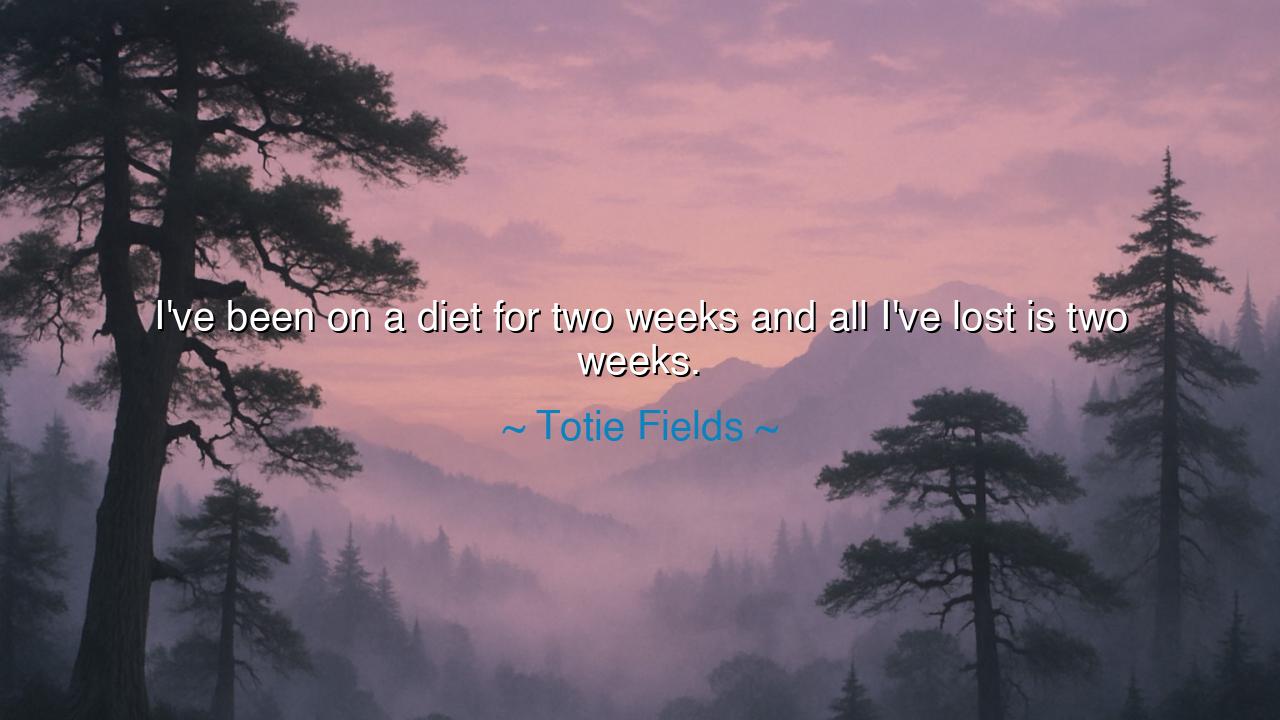
I've been on a diet for two weeks and all I've lost is two weeks.






When Totie Fields declared, “I’ve been on a diet for two weeks and all I’ve lost is two weeks,” she clothed ancient wisdom in the bright robes of laughter. Beneath her wit lies a message deeper than jest — a reflection on the futility of chasing illusion and the tragedy of time wasted in self-denial. Her humor, like that of all the great jesters, hides a philosopher’s heart. For she speaks of a struggle older than modern diets: the human tendency to wage war against oneself, mistaking the body as an enemy instead of a companion.
Totie Fields, one of the first female comedians to win the heart of America, was a woman of immense warmth and courage. Her life was marked by illness, amputation, and pain, yet she faced it all with relentless humor. This quote arose from her own battles with weight and body image — a reflection of how the world judges, and how people, in turn, judge themselves. But in mocking the diet that stole her joy, she teaches something eternal: that life’s value cannot be measured by numbers or scales, but by the light that laughter brings to suffering. Her loss of “two weeks” is not just the loss of time — it is the loss of living, of savoring the simple pleasures that make existence sweet.
The ancients, too, understood this folly of measuring worth by externals. Epicurus, the philosopher of joy, warned that those who chase endless perfection lose sight of contentment. “Nothing is enough for the man to whom enough is too little,” he said. So too does Totie Fields, in her jest, echo his wisdom. To live in constant restraint — denying every pleasure in pursuit of an ever-receding ideal — is to sacrifice the present for the illusion of control. What she calls “two weeks” is symbolic of every moment humanity has traded happiness for anxiety, laughter for guilt, and peace for vanity.
There is power in her irony. To the unwise, her words may seem a simple joke, but to those who listen deeply, it becomes a mirror of truth. For how many of us have lost weeks, months, even years, chasing what we thought would make us whole? The man who pursues riches loses the riches of time; the woman who pursues approval loses the serenity of self; the soul who starves for perfection loses the feast of life itself. Totie Fields’ humor carries the sorrow of that recognition — that we spend our lives dieting on joy, rationing our laughter, and calling it discipline.
Her life stands as testimony. Even when sickness ravaged her body, she never surrendered her laughter. When doctors took her leg, she said, “I’m not crippled — only shorter.” Her humor became her strength, her armor against despair. In mocking her diets and failures, she was teaching humanity how to triumph over pain through perspective. For she knew what the Stoics taught: that the only true loss is the loss of one’s spirit. Everything else — the body, the hunger, the weight — is temporary. But laughter, born of courage, endures like flame against the dark.
Her quote also warns against the modern disease of self-rejection. In every age, people have sought to reshape themselves to fit the mirror of society, forgetting that the soul was never meant to be sculpted by the opinions of others. The ancient Chinese sage Lao Tzu wrote, “When you are content to be simply yourself and don’t compare or compete, everyone will respect you.” Totie’s humor reflects that same wisdom — a reminder that joy and authenticity are worth far more than conformity. For what is the use of a perfect body if the spirit within it starves?
So let the teaching of Totie Fields be this: Do not lose your life while trying to improve it. Seek health, but not obsession. Seek discipline, but not despair. And above all, never sacrifice laughter for perfection, for laughter itself is the sound of a soul at peace. Every diet, every striving, every self-denial that robs you of joy is a diet of the heart — a famine of the spirit.
And when the world tempts you to count what you’ve lost, remember Totie’s wisdom: that the true loss is not in the weight you failed to shed, but in the weeks, the joy, and the laughter you surrendered along the way. Better to live with humor and imperfection than to die in the pursuit of control. For the ancients were right — and so was she — a light heart will always weigh less than a perfect body.






AAdministratorAdministrator
Welcome, honored guests. Please leave a comment, we will respond soon